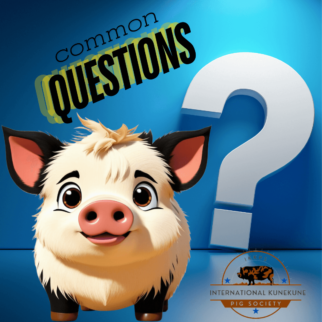
Sign Up
Want to receive a newsletter to learn more about KuneKune pigs and other educational information? Sign up to have them delivered right to your inbox.
We look forwarded to sending you some great info.
KuneKune Questions: Decoding the Common Questions
Today, we will delve into the top 10 frequently asked questions about KuneKune pigs, a small breed known for their friendly nature and unique appearance. These questions cover topics such as their care, behavior, diet, and suitability as pets. Additionally, we will include links to further resources where you can explore in-depth information on each subject, making it convenient for you to access detailed insights and guidance on KuneKune pigs.
What is a KuneKune pig?
KuneKune pigs are a small breed of domestic pig originally from New Zealand. They are known for their friendly nature, docile temperament, and distinct appearance, with small, round bodies and short legs. They come in a variety of colors from solid cream, ginger, black and brown to spotted. Whichever color is first is the color that is listed first. For example a pig that has more black than ginger is a black and ginger. A pig with more ginger than black would be registered as a ginger/black.
Not only is this breed amazingly docile and human oriented but it is also used for a variety of niche markets. They are used for breeding stock, meat pigs, grazing pigs, companions and even pets. To learn more about the breed, check out our ebooks.
Click here if you would like this read to you!

What are the basic care requirements for KuneKune pigs?
KuneKune pigs require a spacious grazing area with access to shelter, clean water, mud puddles and regular vaccinations and dewormings to ensure their health and well-being. Shelters can be as simple or as complex as you desire. Vaccinations are recommended to maintain the health of your pigs and protect them for diseases. We have a great page called about KuneKunes where you can learn everything including what type of fencing to use and water dishes you will need.
What should I feed my KuneKune pig?
KuneKune pigs have specific dietary needs and should be fed a balanced diet of high-fiber pellets, fresh fruits, vegetables, and grass. They should also have access to clean water at all times. We have an incredible article about Pig Feeding that includes some popular feeds that other breeders use and even a feeding chart. Remember that this is a grazing pig and they do best when they have pastures to graze.
Are KuneKune pigs good pets?
KuneKune pigs are known for their friendly and sociable nature, making them excellent pets for individuals or families with the space and resources to care for them properly. They thrive on human interaction and can form strong bonds with their owners. Unlike other breeds of pigs, KuneKune want that interaction with their care givers. They can learn to sit for treats and they will plop at your feet for belly rubs. This is one thing that really sets this breed apart from the others.
Do KuneKune pigs get along with other animals?
KuneKune pigs are generally friendly and get along well with other animals, including dogs, cats, and other livestock. Proper introductions and supervision are recommended when introducing a KuneKune pig to other animals. In general, KuneKunes get along well with chickens, ducks, guineas, goats and other small livestock. What you need to be careful about is mineral and salt blocks from other species. KuneKunes should not have access to them and that can sometimes be a challenge if housed with other animals that do require it.
How can I train my KuneKune pig?
KuneKune pigs are intelligent animals and can be trained using positive reinforcement techniques, such as treats and praise. Consistent training and patience are key to successfully teaching your pig basic commands and behaviors. One thing that I always did with my boars is teach them to come to me directly instead of walking up beside me. The reason I did this, even though boars are usually very docile, is I did not want to get accidentally side swiped by tusk. In teaching them to come directly to me, it avoided any accidental incidents. They learn so fast! I always swore they could tell time. They learn to recognize patterns, like feeding time and will be waiting around feeding time by the gates you enter in! That is why I swore they could tell time.
How do I breed KuneKune pigs?
Breeding KuneKune pigs should be done responsibly and ethically, with careful consideration given to the health and well-being of the animals involved. This is a very important KuneKune question that should be asked and learned about before starting a breeding program. It is recommended to work with a reputable breeder or consult with a veterinarian for guidance on breeding practices. We have some great articles available about selecting breeding stock, learning the breed standards and raising and breeding KuneKunes. Check out the link to learn everything you need to know.
How long do KuneKune pigs live?
KuneKune pigs have an average lifespan of 10-12 years and often more when properly cared for and provided with a balanced diet, regular veterinary care, and a safe environment. While they can live this long it does not mean they can be bred this long. Most sows will begin to reduce the number of piglets that they have right at the end of their breeding careers. Most females usually have 5-7 years of age before they "retire" from breeding. Males have been known to sire litters at even 8 years of age.
Are there any common health issues that KuneKune pigs are prone to?
This is a KuneKune question that we hear often and a very important one. KuneKune pigs are generally hardy and resilient animals, but they can be prone to obesity if overfed and not given enough exercise. Regular monitoring their weight can help prevent health issues in KuneKune pigs. This is where vaccinations can play an important part of your herd maintenance program. Protecting them from various common illness and diseases that most pigs get. One of the most common issues is Salt Toxicity and Heat Stress for KuneKune in the summer months. It is very easily avoided by having a mud puddles and multiple sources of water available. To learn more about these important topics, click the button below.
Where can I find more information on KuneKune pigs?
For more information on KuneKune pigs, you can explore the IKKPS website or consult with experienced KuneKune pig breeders and owners for valuable insights and
advice. IKKPS is proud to have one of the most comprehensive websites available to all KuneKune enthusiast so that you can learn exactly what you want to know about raising this incredible breed and making great decisions for your herd. Be sure to check out all the blog post articles, ebooks, books in the bookstore and all the many pages upon pages of information available right here. Don't hesitate to reach out for answers if you have any questions. Rather you are a member or not, we are happy to help.
Some additional Resources:
Mastering Hoof Care video
KuneKune Herd management video
Registry Office
17500 Hamilton Arms Court Dewitt, VA 23840